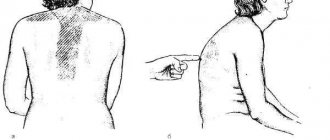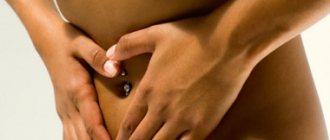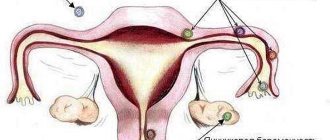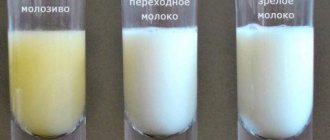After a sperm fertilizes an egg, a cascade of new reactions from different organs and systems is launched in the female body. One of them is painful breast swelling. The mammary glands begin to ache and swell. Nagging pain appears.
When exactly, how many days after conception does your breasts begin to hurt? The answer to this burning question is of particular interest to those who track the onset of pregnancy. This article provides an absolutely comprehensive answer to this very important question.
Chest pain as a sign of pregnancy
The mammary glands may hurt almost immediately after conception (in the first weeks) - this allows women to suspect pregnancy. In the early stages, pain is caused by a sharp increase in female hormones. They provoke tissue swelling, which puts pressure on the nerve endings (at the beginning, discomfort is expressed as tingling or itching).
In parallel with chest pain, nausea and vomiting, sudden mood swings, changes in taste habits (lack of appetite or, conversely, its increase, a desire to eat something for which there was usually no craving) may occur. Such signs are not unique; they, for example, could occur before a missed period (during PMS).
From the end of the first trimester, chest pain will increase and may not stop all day. The reason is not only in hormonal surges, but also in structural changes in the tissue of the glands that are preparing to produce milk.
In addition to breast pain, other changes will occur during pregnancy - the bust will increase in size, the nipples will change their shape and color, and blood vessels may become visible through the skin. In the last stages, colostrum begins to flow.
When do the mammary glands start to hurt?
You should not expect unusual sensations from the mammary glands in the first few days after conception has occurred. Although hormonal levels begin to change immediately, symptoms indicating this process develop later.
The first signs of pregnancy can be felt no earlier than 8-10 days after fertilization of the egg. This period is when the fertilized egg attaches to the uterine wall. Once this process is completed, the hCG level will begin to increase at a rapid pace, which will cause the appearance of characteristic symptoms.
A woman should be prepared for the fact that in the early stages of gestation she will not have any signs of pregnancy at all. Sometimes discomfort in the mammary glands is almost invisible. This also does not indicate any abnormalities.
How long does the pain last?
There is no exact time frame for when chest pain should start or how long it will last. It's always individual. Some women do not experience discomfort in the mammary glands at all (especially during their second pregnancy). But in most cases, the following changes are still observed:
- In the first month, a woman is not tormented by pain, but by pain and itching in the nipple area.
- By the 6th week, breast sensitivity increases due to swelling and intense blood flow, and the woman experiences discomfort from rubbing her nipples with clothing.
- At the 8th week, the formation of glandular breast tissue accelerates. The mammary glands swell and become heavier, the pain becomes intense and prolonged.
- By the 13th week, an active change in the glandular tissue of the breast occurs, aching in different parts of the bust (it hurts severely and constantly).
- By 14–16 weeks, colostrum begins to be released. Before this, the feeling of itching inside the glands usually intensifies.
By week 38, the breasts are considered ready for the birth of the baby; they are able to fully produce milk. By this time (or a little later - for example, by 39 weeks) for most women, any discomfort in the chest goes away. All that remains is heaviness due to the engorged glands, but the expectant mother quickly gets used to the new weight of her bust.
So, chest pain in itself during pregnancy is not a warning sign. But you should be wary if the following symptoms accompany it:
- There is blood or purulent green discharge coming from the nipples. This can occur when wounds appear and become infected. This also happens with tumors.
- When palpating the chest, nodules are revealed. This could be a cyst, galactocele, fibroadenoma, or malignant neoplasm.
- The breast swells, but the nipple shrinks and retracts into the gland. This is an alarming signal, as in most cases it indicates cancer.
- The appearance of purple or blue spots on the chest (as from bruises), which feel sharp pain when touched.
Women should be attentive to themselves; if these signs appear, they should definitely go to the hospital. Any delay threatens exacerbation of pathologies, which can cost the lives of both mother and child.
Why do breasts hurt during pregnancy - the main reasons
Depending on the duration and individual characteristics, the woman feels discomfort and pain in the mammary glands.
Let's study how the nature of pain changes depending on the trimester.
In the early stages
1st trimester. At an early stage, provided that the woman has not experienced hormonal disruptions, the gland begins to respond to changes in the general condition. Minor tingling, sometimes burning and discomfort are felt in the chest. She starts to hurt like before her period. In rare cases, clear fluid may be discharged from the breast.
In the later stages
The 2nd trimester is the time of active growth of the mammary glands. During this period of time, the body is focused on preparing the breasts for feeding. At this time, in pregnant women it may increase in size, normally by 2-6 cm in girth.
The 3rd trimester is a calmer period. The breasts are already almost formed, and all hormones are working in a stable mode without sudden jumps. As a rule, it can still increase by 3-4 cm in girth, and there is also discomfort and slight tingling. However, more relaxed. In the eighth or ninth month, colostrum begins to be released.
Pain during frozen pregnancy
If the fetus stops developing, the amount of progesterone in the woman’s body will sharply decrease. This leads to many changes. For example, during a frozen pregnancy, the pain in the chest suddenly stops, and the glands themselves seem to fall off (“deflate”) - they become very soft and lose their shape.
Breast changes in themselves do not indicate a frozen pregnancy. In addition to this symptom, other warning signs should appear:
- Purulent and bloody discharge from the genitals.
- Weakness, nausea, vomiting (more intense than with toxicosis).
- A sharp increase in body temperature.
- Cramping pain in the lower abdomen.
If such symptoms appear, you should immediately seek help from a doctor. Of course, it is impossible to resurrect a child during a frozen pregnancy, but the decomposing fetus must be removed as early as possible so that complications do not begin that threaten the woman’s life.
Phantom breast pain
Those women who are waiting to conceive, on the contrary, listen too closely to the signals that their body gives them. Sometimes the desire to become a mother is so great that even without pregnancy, girls discover signs of it.
They regard slight nausea, increased sensitivity of the mammary glands, malaise, excessive fatigue, mood swings and increased appetite as symptoms of conception. Although all of the listed changes in the body are not specific only to pregnancy.
Such signs can appear even with minor fluctuations in hormonal levels. They are often associated with approaching menstruation. In order not to be tormented by doubts, it is not necessary to immediately go to the doctor. It is enough to take a pregnancy test at home.
Sometimes chest pain becomes very severe, which requires consultation with a specialist. If this symptom has been bothering you for a long time, then even at the stage of pregnancy planning it is necessary to undergo a mammogram.
This recommendation is especially relevant for those women who have previously undergone therapy aimed at getting rid of any breast disease. If the medications are not stopped and pregnancy occurs, they may need to be replaced.
If a woman suffered from pathological changes in the mammary gland before conception, unusual symptoms may appear after pregnancy.
Pain during ectopic pregnancy
It happens that the fertilized egg cannot reach the uterus and attaches to the tubes. This is called an ectopic pregnancy. In this case, there cannot be full development of the fetus, since the oviduct is not capable of stretching as much as the uterine tissue. The embryo simply ruptures the tubes and causes internal bleeding.
During an ectopic pregnancy, it is very important to recognize the pathology in a timely manner in order to certainly avoid complications. But what makes diagnosis difficult is that in the first weeks the woman experiences the same symptoms as during normal fetal development. The chest hurts in the same way - no more and no less. Only thorough examinations by a gynecologist can help identify pathology, so preventive visits to the doctor cannot be neglected.
How and where breasts hurt during pregnancy - the nature of the pain
Symptoms are usually mild, there are no strong or acute sensations. There is a slight tingling sensation and increased sensitivity in the nipple area.
Closer to the 2nd trimester, the signs become more pronounced. This is due to a significant increase in volume and her preparation for feeding. It becomes denser to the touch, and heaviness is observed. In some cases, a woman may feel an increase in temperature.
Towards the end of pregnancy, the severity of sensations fades and resumes only during lactation.
After an abortion
After artificial termination of pregnancy, all women experience breast pain. The pain can be of different types. Some people experience strong lumbago under the right or left breast in the first days. Other women suffer from itching in the nipple area.
The breasts should hurt after an abortion due to the fact that the body still continues to produce a lot of estrogen and progesterone. It takes at least 14 days for hormonal levels to normalize after a surgical abortion. After medical termination of pregnancy, recovery occurs a little faster (the peak of pain occurs in the first 3–5 days, then it becomes less and less).
If pain in the glands continues 2 weeks after the abortion, you should inform your gynecologist or mammologist about this. It is especially bad when pain in the chest is accompanied by severe cramps in the abdomen, increased body temperature, and intense bleeding from the genitals. This condition is life-threatening for a woman and requires prompt hospitalization.
Do breasts always hurt during pregnancy?
Around the second week, the body “understands” that conception has occurred. As soon as the fetus begins to form, the hormone progesterone enters the blood, even in small doses. So, if you are interested in the question of what day exactly the breasts begin to hurt, we can say that already on the 10-14th day after conception, a woman may feel discomfort in the mammary glands.
The first trimester starts the process of active production of estrogen, and it begins to hurt like during menstruation. However, the sensations during menstruation are somewhat different, since the mammary glands do not enlarge, but only swell. If a woman has a hormonal imbalance or has suffered from diseases of the thyroid gland or ovaries, then while carrying a child, the mammary glands may not hurt.
The fact is that the hormonal background is unstable and may not give the reaction that occurs after conception. Sometimes the mammary glands swell slightly before the delay, and the woman is bothered by a slight tingling and burning sensation. And in some cases, when the hormonal balance is disturbed, during conception, even after a surge of hormones, the breasts do not react, taking such a reaction as a typical state of the body.
So, pain symptoms are not observed in 100% of pregnant women. It all depends on the individual characteristics of the person. Therefore, the question of whether pain is present at the beginning of pregnancy cannot be answered unambiguously. In addition, more significant changes occur in the second and third trimesters.
How to reduce pain?
If we are not talking about pathologies and pain is a normal consequence of the restructuring of the body, then this still does not mean that it must be endured throughout the pregnancy. There are ways to help reduce discomfort:
- Daily chest massage will disperse blood through the vessels and prevent the formation of seals and venous mesh.
- In moments of exacerbation of pain, you can wipe your chest with pieces of ice.
- Do not wear tight underwear, as contact with it will intensify the pain.
- Drink a lot of water (dehydration leads to dry skin), make sure there is enough protein, minerals, and vitamins in your diet.
Pregnant women are prohibited from choosing painkillers (especially Aspirin) on their own. If the pain is too severe, you should inform your doctor. Based on how the pregnancy is progressing and the woman’s general condition, the specialist will select the appropriate drug (for example, it could be Paracetamol, ketoprofen ointment, natural creams).
How long can chest pain and discomfort last?
So, pain can begin at the beginning of pregnancy, continue during the first trimester, and after that - at the end of pregnancy.
Painful sensations and discomfort disappear towards the end of the first trimester due to the fact that by about the 12th week the female body fully adapts to all the hormonal changes that have occurred to it. Around this time, the expectant mother exhibits the main symptoms and signs of early toxicosis.
An important point: the strongest sensitivity and its peak occur in the morning, and towards the end of the day it fades away. Due to stronger blood circulation in the body, breast tissue increases in size. And if the expectant mother follows a normal, healthy routine and leads a lifestyle that corresponds to this routine during the day, then the sensations will pass much earlier.
Breast care rules
The main mistake pregnant women make is not taking care of their body during pregnancy. The result of such inaction is unsightly stretch marks and loss of bust shape (after breastfeeding, the glands become smaller and sag). To prevent this from happening, from the first days after conception you need to use external products that increase the elasticity of the skin of the breast and nourish the tissue with useful substances. Weleda and Levrana oils, Mustela Maternity serum, Mama Comfort, Bepantol, Biolane creams have these properties.
It is important for women to maintain breast hygiene - wash them daily and use absorbent pads when colostrum is secreted. This protects against skin irritation and infection in the ducts.
You must wear a special bra with a supportive effect. Its cups should fit tightly around the mammary glands, lifting but not squeezing them. The fabric of the underwear should be natural, well breathable. A properly selected bra protects the breasts from injuries, stretch marks, relieves stress from the spine and reduces pain.
It is important to have regular checkups with your doctor throughout your pregnancy. Some pathologies (including breasts) occur with subtle symptoms that cannot be detected at home. Timely detection of health abnormalities will allow treatment to begin as quickly as possible and thereby protect against complications.
Additional signs indicating pregnancy
Breast tenderness is not the only sign of pregnancy. There are still a huge number of symptoms indicating the development of new life in the womb, and all of them are of a purely individual nature.
The main signs of an interesting situation include:
- Nagging pain in the uterine area. Most women experience similar sensations during menstruation. When an egg is fertilized, painful sensations in the lower abdomen can begin 2 days before the expected date of menstruation and persist for 7 days after it. In this case, you need to be especially careful about this sign, since it can also warn of a possible threat of miscarriage.
- An increase in basal temperature, which is caused by a change in the level of progesterone in the blood. An increase in BT levels occurs in several cases: before ovulation, in the first days after successful fertilization of an egg by a sperm and in the presence of certain pathological conditions and diseases of the reproductive system. During pregnancy, the thermometer will show 37°C-37.5°C. It is extremely important to follow all the rules for measuring basal temperature. This is written in more detail in one of our previous publications.
- Frequent urge to urinate. Observed for a period of 2 to 3 weeks. The reason for this is an increase in the concentration of sex hormones and increased blood circulation in the pelvic organs.
- Constant feeling of drowsiness and fatigue. This condition is also caused by increased progesterone levels.
- Disorders of the gastrointestinal tract. One of the most common signs of pregnancy. This can be manifested by diarrhea, flatulence, constipation, vomiting, nausea, especially in the first half of the day. Gastronomic preferences may change and the sense of smell may become more acute.
- Delay of menstruation. On the day of the expected menstruation, spotting may appear, but full menstruation will not occur if the fetus is already developing in the woman’s body. Although in some cases, menstruation can occur even after pregnancy - we also talked about this in one of our previous articles.
Other first signs of early pregnancy
In addition to changes in the breasts after conception, there are a number of other signs of pregnancy associated with changes in the psychological and physiological state of the woman.
Table. First signs of pregnancy
| Physiological signs | Psychological signs |
| 1. General malaise . Lethargy, weakness, without any signs of colds. Extreme fatigue, for no reason. | 1. Unstable emotional state . Frequent mood swings, especially in emotional women. |
| 2. Toxicosis . Nausea and vomiting, for no reason. There may be an aversion to any food. And, conversely, a strong addiction to certain dishes. | 2. Excessive drowsiness, or insomnia. |
| 3. Heartburn . Bloating. | 3. Discomfort in a sitting position is noted from the first days of pregnancy. At a later stage of pregnancy, it is difficult to find a comfortable lying position. |
| 4. Frequent urge to go to the toilet. | 4. Sensitivity to odors . There is an aversion to smells that you previously liked. A pregnant woman may like unpleasant chemical odors. |
| 5. Dizziness. | 5. Increased appetite . Especially to those products and dishes that you didn’t like before. |
| 6. Lower back pain . Minor bleeding. | |
| 7. Thrush. | |
| 8. Headache. | |
| 9. Heaviness in the pelvic area , a feeling of constant fullness in the abdomen. | |
| 10. Fever and chills . Throughout the day it can feel either hot or cold. |
An unpleasant consequence of breast growth is the appearance of stretch marks.
If you begin to feel discomfort and unpleasant sensations in your breasts, you are wondering how long after conception your breasts hurt, to determine a possible pregnancy, and the test does not determine the beginning of fertilization, it is best to visit a gynecologist to accurately determine your health status and eliminating possible symptoms of serious breast diseases.
And in case of pregnancy, prepare for all the hardships and inconveniences, so that after a while you can fully enjoy the happiness of motherhood.
How to prepare your breasts for changes?
The first thing you need to do is go to an appointment with a mammologist, who will examine you and give the necessary recommendations. This will eliminate the presence of various types of formations on the mammary glands, which during pregnancy increase their shape and can become malignant. For your own safety, do not be lazy to perform this procedure. It is enough to contact an experienced specialist.
Another important problem is the condition of the breasts after pregnancy. Women are very worried about this, since often the breasts lose their shape after the mother stops feeding the baby. The muscles and ligaments that support the breasts weaken. As people say, breasts deflate like balloons and completely sag. In order to avoid such an unpleasant pregnancy outcome, it is important to know what measures to take.
Does taking contraceptives affect the appearance of chest pain and lack of menstruation?
The breasts ache in the first months after starting to take combined oral contraceptives, which is explained by the influence of the increased content of the estrogen fraction in the drug. In tablets, the concentration of estrogen exceeds its own. The body adapts to this dosage. Due to the insufficient maturity of the functional layer of the endometrium, menstruation may not occur after taking the last pill in the cycle. Such symptoms disappear within 3 months.
What effect does the drug Postinor have on a woman’s body?
Every modern woman already knows about the method of emergency contraception - taking Postinor after unprotected sexual intercourse. The risk of unplanned pregnancy is reduced due to the fact that the increased content of the synthetic hormone in the drug increases the viscosity of mucus in the vagina and cervical uterus, thereby creating an obstacle to the further advancement of male reproductive cells.
Before using Postinor, you should consult a gynecologist to exclude possible contraindications and side effects from taking the drug!
Menstruation after taking the drug is somewhat different from the usual “critical days”. The day your period begins may not coincide with the expected date of your period. With the use of Postinor, “critical days” occur outside the cycle, are spotty, scanty in nature, end after 2-3 days, but have the peculiarity of being duplicated several times per cycle. In this case, they say that the drug had an effect as planned, and conception did not occur.
If, after Postinor, menstruation does not appear, but the woman is not pregnant, then another hormonal imbalance has occurred due to other reasons.
Why are there no periods while taking Duphaston?
Gynecologists most often prescribe Duphaston to normalize the menstrual cycle in its second phase. Bloody discharge from the genital tract appears 2-3 days after discontinuation of the drug. If the “critical days” do not come after Duphaston, this may indicate that the woman is pregnant.
If there is no bleeding from the genital tract 10 days or more after stopping Duphaston, you should take a pregnancy test and consult a gynecologist!
Not every pharmacy test strip gives a positive result during early pregnancy. The gestation period (the formation of fetal tissues and organs) may be so short that the common method used to detect pregnancy may simply not detect changes in the urine. To clarify the presence or refute of pregnancy, you should take a blood test for hCG (human chorionic gonadotropin).











